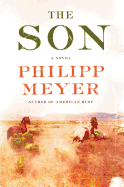
In mid-19th century Texas, when Eli McCullough is 12, Comanches kill his family and take him captive. A generation later, Eli's son Peter rebels against his father after the latter orders the mass slaying of a family of Mexicans on the land adjacent to theirs. And 100 years after, Eli's granddaughter Jeannie McCullough, now 86 and a formidable businesswoman, lies prone on the floor of her parlor, wondering what has happened to her while slowly losing consciousness. These three narrative threads, taking place over a span of nearly two centuries, set the scene for The Son, a novel that is an epic in the truest sense of the word: massive in scope, replete with transformations in fortune and fate, and drenched in the blood of war.
Each viewpoint character is distinct in personality, with his or her own particular voice--though in what is probably deliberate choice on the part of the author, Eli and Jeannie show similarities in their toughness and will to survive. While the focus is on a single family, author Philipp Meyer (American Rust) uses these interlinked life stories to tell, in microcosm, the much larger story of the founding of Texas. As the balance of power shifts--with considerable carnage--among the Comanche tribe, the Spanish, and the Anglo settlers, so does the economic and environmental reality of the state, as cattle eventually give way to oil in the 20th century. Grasses that prior to European settlement were "balls high" vanish, chewed away by the cattle of the settlers, leaving a barren landscape. Meyer's vision of human habitation on land is irrevocably harsh, a thing that lays waste not only to people but to the land itself.
As the stories of three generations of McCulloughs intertwine, mysteries emerge: How did Eli, now known as the Colonel, go from ragged captive to wealthy cattleman? Why was Eli so eager to destroy the Garcias, the Mexican family that his son Peter wished to save? And how did Jeannie, a strong and independent woman even in her 80s, come to be lying on the floor of her home in a room that smells increasingly of gas? Gradually, but in the course of a swift-flying plot, Meyer unmasks the answers to these questions, which all turn out to be tied to one theme: the inexorability of history, no matter the players, and the unbreakable cycle of violence over centuries that is relentless as the tides.
Depictions of brutality in The Son, recounted without emotion, are exceptionally harrowing. Scenes of gang rape, dismemberment, massacre and torture are just graphic enough to leave a lasting impression in the mind--or perhaps a better word would be a scar. These horrific events serve as a constant reminder that Texas, and the United States as a whole, was forged in blood--that of the indigenous people and of the Europeans who settled there.
In that way it is no different from any other place, as Meyer frequently takes a long view of history and the central role of atrocities in it. At one point Jeannie thinks of her own place in history, "A man, a life--it was barely worth mentioning. The Visigoths had destroyed the Romans, and themselves been destroyed by the Muslims. Who were destroyed by the Spanish and Portuguese. You did not need Hitler to see that it was not a pleasant story. And yet here she was.... The blood that ran through history would fill every river and ocean, but despite all the butchery, here you were."
And here, by implication, we are. Eli McCullough is a creature of violence, yet without him his family would not have survived, would certainly not have become so wealthy from cattle-raising and later, from oil drilling. The moral complexity at the core of the novel is laid bare, raising ever more complicated dilemmas with each successive page. Every time the reader may tempted to judge the vicious actions of a character, that character is later revealed to be no more nor less than a human being. Thus any judgment cast upon that character must redound back, disquietingly, to ourselves.
Lush with historical detail, The Son is a vivid evocation of time, place... and the violence that lies at the heart of both the destruction and emergence of societies throughout history. --Ilana Teitelbaum

